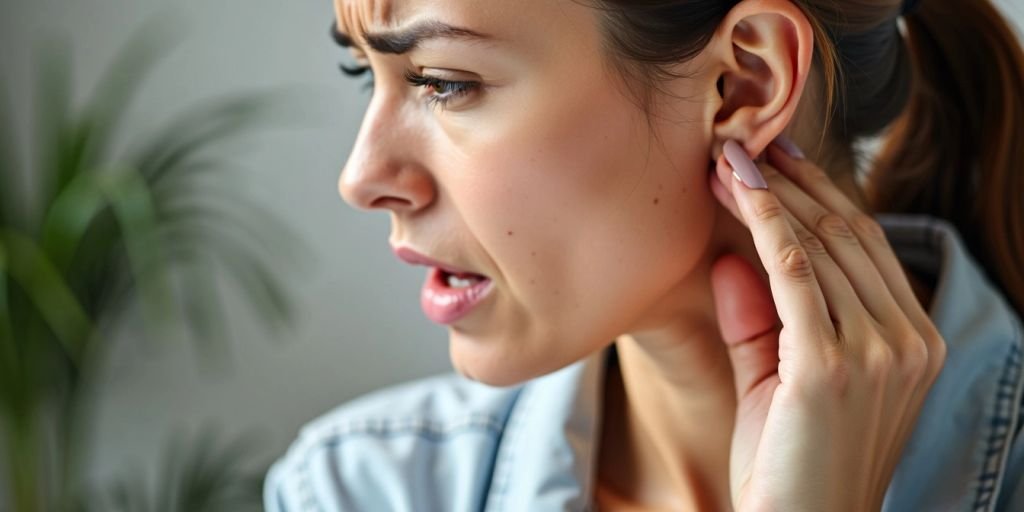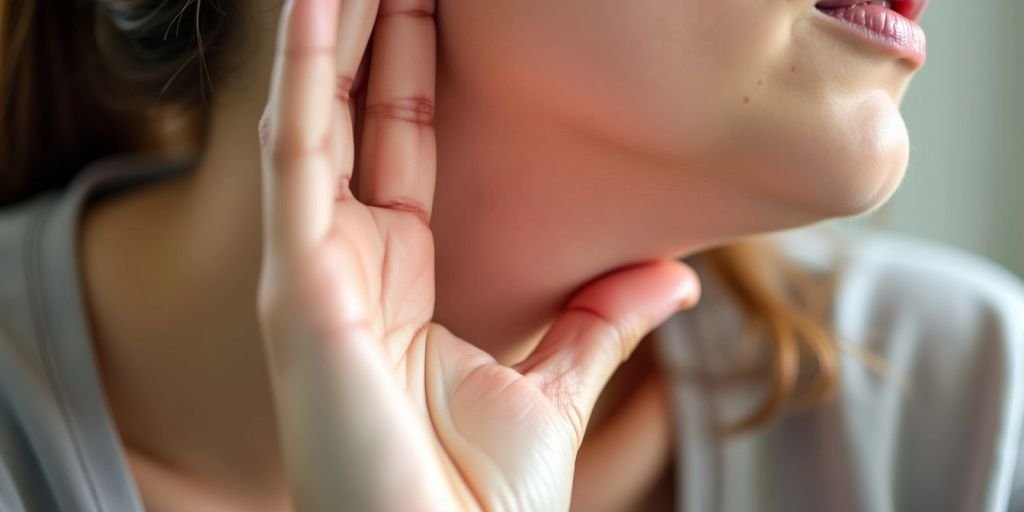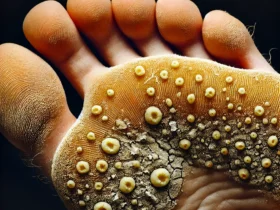Table of Contents
Experiencing an itchy throat and ears can be more than just a minor annoyance. It can disrupt daily activities and make it hard to focus. Understanding the root causes, symptoms, and remedies can help you find relief and prevent future occurrences. This article explores why your throat and ears might itch and offers practical solutions to manage the discomfort.
Key Takeaways
Common Causes of Itchy Throat and Ear

Itchy throat and ears can be quite bothersome. Understanding the common causes can help you find the right remedy and relief. Here are some of the most frequent reasons behind these symptoms:
Allergic Rhinitis
Allergic rhinitis, also known as hay fever, is a common cause of itchy throat and ears. When your body reacts to harmless substances like pollen, dust mites, or pet dander, it releases chemicals that cause inflammation and itching. Regular exposure to common allergens can make these symptoms worse. Other symptoms of hay fever include:
Food Allergies
Food allergies occur when your immune system overreacts to certain foods, such as peanuts or eggs. This can cause itchiness in the mouth, ears, and throat. Severe food allergies might also lead to symptoms like stomach cramps, vomiting, diarrhea, hives, or even anaphylaxis.
Dry Ear
Dry ear can also lead to itching. When the skin inside your ear becomes too dry, it can cause discomfort and itchiness. This is often due to environmental factors like low humidity or excessive cleaning of the ears.
Ear Infections
Itchy ears can sometimes be a sign of an ear infection. Bacteria and viruses cause them, usually when you have a cold, the flu, or allergies. If you suspect an ear infection, it’s important to consult a doctor for proper diagnosis and treatment.
Symptoms Associated with Itchy Throat and Ear
Itchy Throat Symptoms
When you have an itchy throat, you might feel a tickling or scratchy sensation at the back of your throat. This often leads to an urge to cough or clear your throat frequently. Some people also feel like something is stuck in their throat, which can be quite annoying. Mild soreness or rawness, especially when swallowing, is also common.
Itchy Ear Symptoms
Itchy ears can cause inflammation and redness inside the ear. You might feel a nagging urge to scratch or insert a finger into your ear. Sometimes, there is a sensation of fullness or blockage in the ear, and mild pain or discomfort that comes and goes. Occasionally, you might notice flaky or dry skin around the ear opening.
When to Seek Medical Attention
If your itchy throat and ear symptoms persist despite home treatments, it’s important to consult a doctor. Symptoms like difficulty breathing, pain, swelling, or hearing loss could indicate a more serious issue. Additionally, if you are unsure about your allergies or if your current treatment isn’t working, a visit to the doctor is essential. Medical professionals can perform allergy tests to identify specific allergens and recommend effective treatments.
Home Remedies for Itchy Throat and Ear

Dealing with an itchy throat and ear can be quite uncomfortable. Fortunately, there are several home remedies that can provide relief. Here are some effective methods to try at home:
Hydration and Humidification
Keeping your body well-hydrated is essential. Drinking plenty of fluids like water, herbal teas, and broths can help soothe an itchy throat. Using a humidifier in your home can also add moisture to the air, preventing dryness in your throat and ears.
Nasal Sprays and Decongestants
Nasal sprays can help keep your nasal passages moist, which can reduce itching in both the throat and ears. Decongestants can also help relieve symptoms by reducing nasal congestion.
Throat Lozenges and Honey
Throat lozenges can provide immediate relief for an itchy throat. Honey is another excellent remedy; it acts as a natural anti-inflammatory and can coat the throat, reducing itchiness. You can add honey to warm beverages like lavender tea for added comfort.
If your symptoms persist despite trying these remedies, it may be time to consult a healthcare professional for further advice.
Over-the-Counter Treatments
When dealing with an itchy throat and ear, over-the-counter (OTC) treatments can offer quick relief. Here are some common options:
Antihistamines
Antihistamines can help reduce the body’s reaction to allergens. They are especially useful if your itchy throat and ear are due to allergies. Popular choices include:
Ear Drops
Mineral oil ear drops can help if your ears are itchy due to wax buildup. These drops soften the wax, making it easier to remove. Remember, never put anything solid, like a cotton swab, into your ear to scratch an itch.
Cough Drops and Lozenges
Cough drops and lozenges can soothe an itchy throat. Look for ingredients like menthol, honey, and glycerin. However, be cautious as they can be a choking hazard for young children.
If symptoms persist, it’s important to consult a healthcare provider for further evaluation and treatment options.
Preventive Measures

Avoiding Allergens
To prevent itchy throat and ears, it’s important to avoid known allergens. If you know what triggers your symptoms, such as pollen or pet dander, try to stay away from them. This can help reduce allergic reactions that cause itchiness.
Maintaining Good Hygiene
Good hygiene is key to preventing infections that might lead to itchy ears and throat. Regular handwashing and avoiding close contact with sick individuals can help. Also, gently clean the outer ear with a cloth to prevent buildup, but avoid inserting objects into the ear canal.
Using Humidifiers
Using a humidifier, especially in dry climates or during winter, can prevent throat and ear dryness. A humidifier can add moisture to the air, making it easier to breathe and reducing the chances of dryness and itchiness.
Staying hydrated and using a humidifier can greatly enhance your overall comfort and well-being.
By following these steps, you can minimize the chances of experiencing itchy throat and ears.
When to Consult a Doctor
Persistent Symptoms
If your itchy throat and ear symptoms last for more than a few days or don’t improve with home remedies, it’s time to see a doctor. Persistent symptoms can indicate a more serious issue that needs medical attention. For example, if the itchiness lasts for longer than a few days, or doesn’t go away with a home remedy of olive oil drops, make sure you see your doctor.
Severe Reactions
Seek immediate medical help if you experience severe symptoms like difficulty breathing, swelling, or intense pain. These could be signs of a serious allergic reaction or infection. If you have trouble breathing, wheezing, or facial swelling, you may need urgent care.
Allergy Testing and Diagnosis
If you’re unsure about what’s causing your symptoms, a doctor can perform allergy tests to identify the triggers. This is especially important if over-the-counter treatments and home remedies aren’t working. Knowing your specific allergies can help you avoid them and manage your symptoms better.
It’s crucial to consult a medical professional if your symptoms persist or worsen, as early diagnosis and treatment can prevent complications.
Conclusion
Dealing with an itchy throat and ears can be frustrating, but understanding the causes and remedies can make a big difference. Whether it’s allergies, infections, or environmental factors, knowing what triggers your symptoms is the first step to finding relief. Simple home remedies like staying hydrated, using a humidifier, and avoiding known allergens can help. If symptoms persist, it’s important to consult a doctor to rule out any serious conditions. By taking proactive steps and seeking medical advice when necessary, you can manage and alleviate the discomfort of an itchy throat and ears.
Frequently Asked Questions
What causes an itchy throat and ears?
An itchy throat and ears can be caused by allergies, infections, dry air, or even irritants like smoke and perfume. Understanding the root cause can help in finding the right treatment.
Can food allergies cause itchy throat and ears?
Yes, food allergies can cause itchiness in the throat and ears. Common food allergens include nuts, eggs, and dairy products.
What are some home remedies for itchy throat and ears?
Home remedies include staying hydrated, using a humidifier, gargling saltwater, and using throat lozenges or honey. Nasal sprays and decongestants can also help.
When should I see a doctor for itchy throat and ears?
You should see a doctor if your symptoms persist despite home treatments, if you experience severe reactions, or if you have difficulty breathing, pain, or swelling.
Can over-the-counter medications help with itchy throat and ears?
Yes, over-the-counter medications like antihistamines, ear drops, and cough drops can provide relief from itchy throat and ears.
How can I prevent itchy throat and ears?
Preventive measures include avoiding known allergens, maintaining good hygiene, using humidifiers, and staying hydrated.














Leave a Review